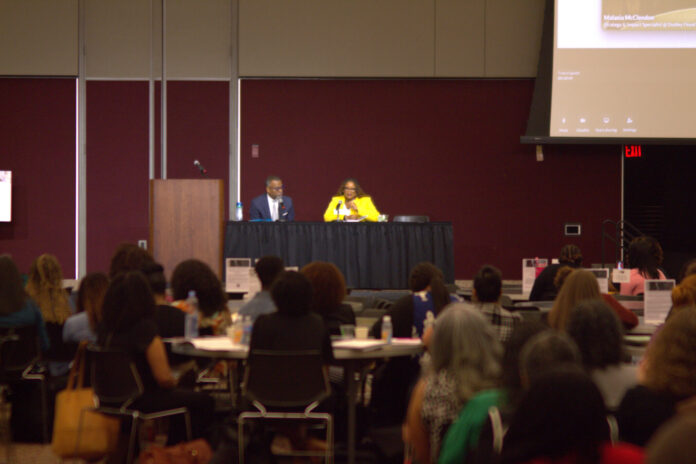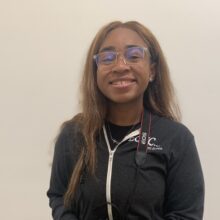Dr. Eddie Glaude Jr. is a New York Times bestselling author, scholar, political commentator, and James S. McDonnell Distinguished University Professor at Princeton University.
Last month, Glaude also served as the keynote speaker for the 2024 Color of Education Summit, hosted by the Dudley Flood Center for Educational Equity and Opportunity on Sept. 27-28. This year’s theme was “Collective Action: People and the Arc of Justice.”
As expressed in Glaude’s most recent book, “We Are the Leaders We Have Been Looking For,” his speech emphasized the role of “ordinary people” in creating change and building democratic communities.
“Our task is not to lead folk, but to create the conditions under which everyday, ordinary folk come to understand themselves as the leader,” Glaude said.
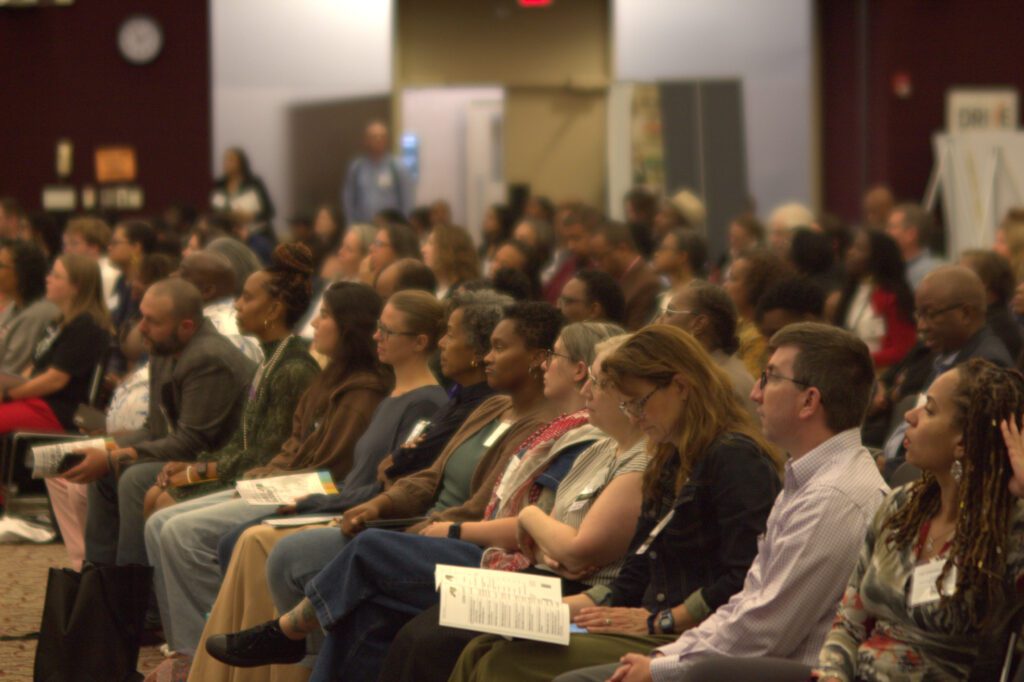
Glaude’s message to the audience was significantly anchored in the life and work of Ella Baker. Referring to her as one of the most important thinkers and activists of the 20th century, Glaude conveyed deep reverence for Baker’s philosophy and approach regarding organizing.
Baker was born in Virginia, but her legacy is deeply rooted in North Carolina. After moving, she was raised in Littleton. She later relocated to Raleigh to study at Shaw University.
In the years after her graduation, Baker went on to impact the lives of many through community organizing and civil rights activism. She held leadership positions in numerous organizations like the National Association for the Advancement of Colored People (NAACP) and the Southern Christian Leadership Conference (SCLC).
In 1960, a SCLC conference developed by Baker extended an invitation to college students following their involvement in student-led desegregation sit-ins. This gathering would lead to the foundation of the Student Nonviolent Coordinating Committee (SNCC) to support the student activism.
Glaude noted Baker’s objection to SNCC being merged into pre-existing organizations, and said that she argued for the student activists to charter their own path.
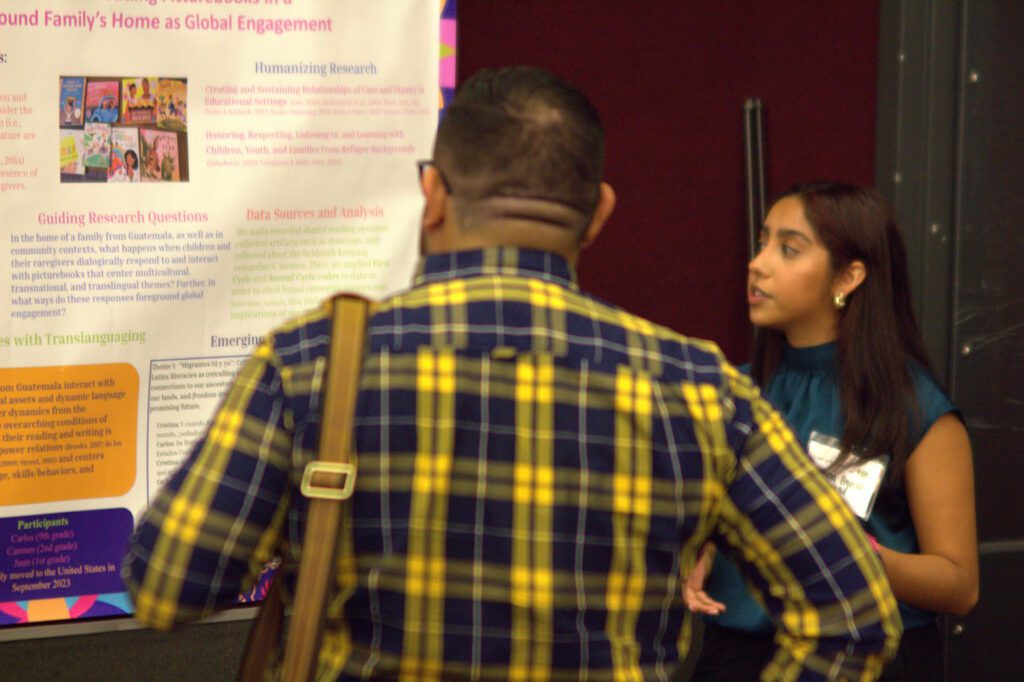
This reflected Baker’s belief in the decentralization of organizational structures, Glaude said, along with her rejection of “charismatic leadership.” Such leadership, she thought, could lead to dependency on individual leaders, who could then fall victim to the limelight and view themselves as more important than the greater movement.
Therefore, Glaude said that the responsibility of democracy and change can’t be outsourced to politicians and heroic figures. Rather, he said he aligns with Baker’s belief that people “have to be made to understand that they cannot look for salvation anywhere but to themselves.”
“This realization depends upon encounters for critical participation with others that can generate self-trust,” he said. “And self-trust enables collective efforts among the most unlikely of people to transform unjust conditions.”
Overall, Glaude said that the salvation of democracy lies in the willingness of everyday people to share a responsibility in the fight for democracy.
“It is in our hands. It is in your hands. It is in my hands,” he said. “Now let’s fly and become the leaders that we’ve been looking for.”
About the Flood Center
As explained on their website, the Flood Center serves as a “hub to identify and connect organizations, networks, and leaders to address issues of equity, access, and opportunity in education across North Carolina.” Throughout the year, the center hosts several programs and initiatives aimed at advocating for equity in education.
In August, for example, the Flood Center launched the latest cohort of the Rural Teacher Leader Network. The network encourages collaboration across rural districts while supporting educators by deepening their understanding of leadership, equity, and trauma-informed practices.
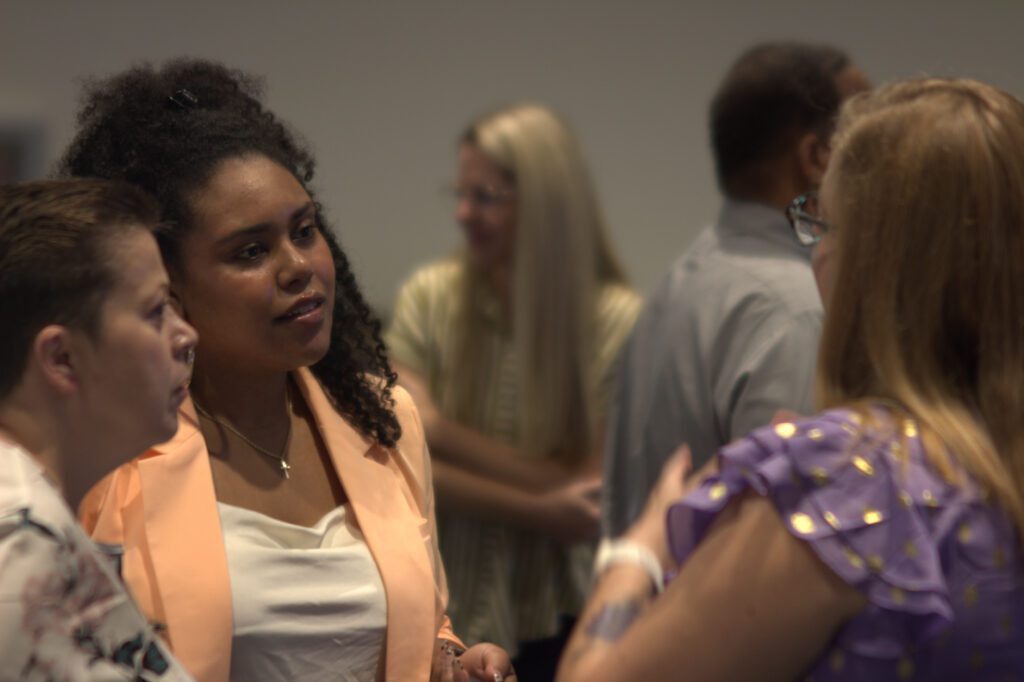
Mapping the Movement is another one of the center’s efforts to mobilize education stakeholders. The convenings are held multiple times a year, allowing attendees to strategize around the following priorities:
At the end of 2023, the Flood Center was unanimously elected to be the governing body of the Developing a Representative and Inclusive Vision for Education (DRIVE) coalition. This means that the center will continue the work outlined in the final report of the task force, which was established by Executive Order 113 issued by Gov. Roy Cooper in 2019.
And most recently, the Flood Center held its Color of Ed Summit, which is a partnership between the Flood Center, Public School Forum of North Carolina, Duke University’s Samuel DuBois Cook Center on Social Equity and Center for Child and Family Policy, and Sandra Wilcox Conway of Conway and Associates.
As previously mentioned, this year’s summit focused on collective action. Over the two days of the hybrid event, some of the objectives included making historical connections between past and present, investigating and developing solutions for policy, and allowing for collaboration across the network of attendees.
About Color of Ed
Hundreds of people flock to the summit every year to connect with like-minded individuals, as well as learn how they can make a difference in their communities.
Dr. Deanna Townsend Smith, senior director of the Flood Center, said that each summit builds on to the next one.
“We are in good trouble, and we do not apologize for it,” she said, quoting John Lewis in front of more than 850 attendees.
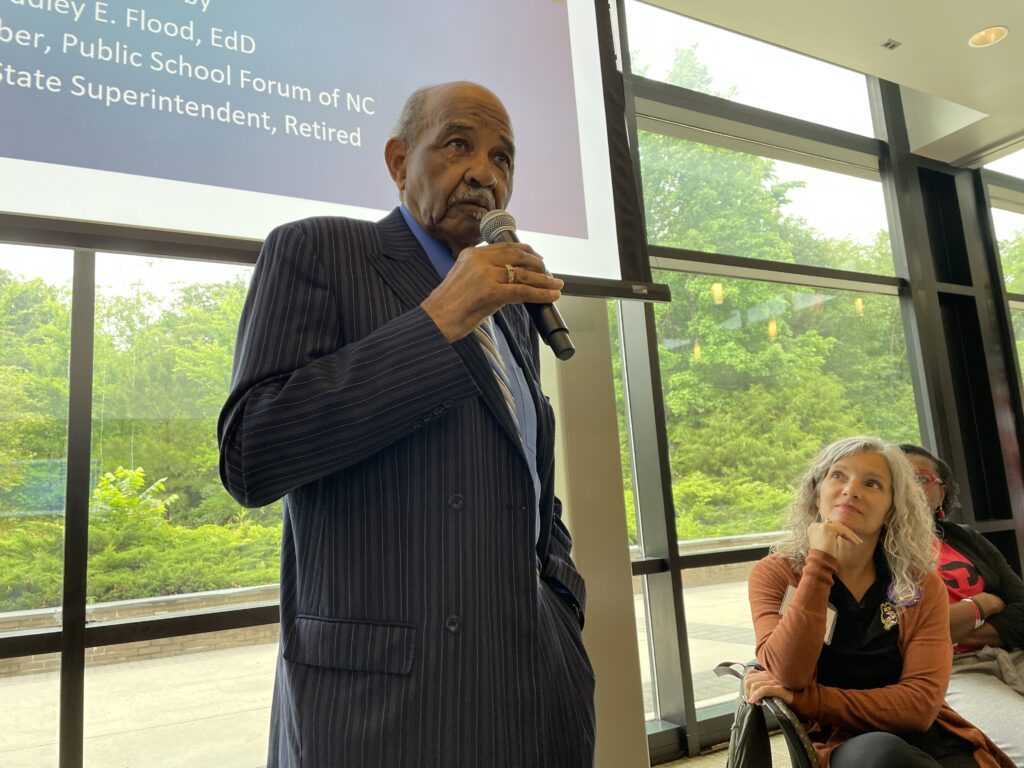
As namesake of the Flood Center, Dr. Dudley Flood spoke about learning and adapting to a world that is “coming, but is not fully here.” He spoke of his 70 years in education, as well as his 90 years of life.
“So I found it important for us to mix among those people from all generations, from all walks of life, from all sets of circumstances, and to gather collective perspective of what the world is to be like,” Flood said.
“Doing the work that we do at LatinxEd, working specifically with Latine education leaders, and empowering them to think about the ways in which they can use their voice and power to make a change, I was really struck by the opportunities to think about how we do that collectively. I think for me, collective action looks like really empowering educators and empowering the community with the information that they need to make a change. … I’m just really grateful for the information and the connections that were brought out here because our liberation is tied and we can’t be liberated until all of us are liberated. I really see that as the foundation of collective power in action.”
Kiara Aranda, director of programs at LatinxEd
Dr. Mary Ann Wolf, president of the Public School Forum, said that the need and importance of the Flood Center continues to expand. The Public School Forum houses the Flood Center.
“We aim to achieve equity in education across North Carolina through building connections and engagement across fields of research, policy and practice,” Wolf said. “If you know the Flood Center team, you know they are out in the field pretty much every single day.”
Attendees like Kenya Grant, a principal in Warren County, said she valued the sharing and learning the summit provides.
“I think networking, being able to network with different cultures and different people of color is so significant to the work that we do, so that we know that we’re not working in silos,” Grant said. “That there are other people out here who have great ideas, and that they can — we can — collaborate with them and grow and learn based on what they do at their schools.”
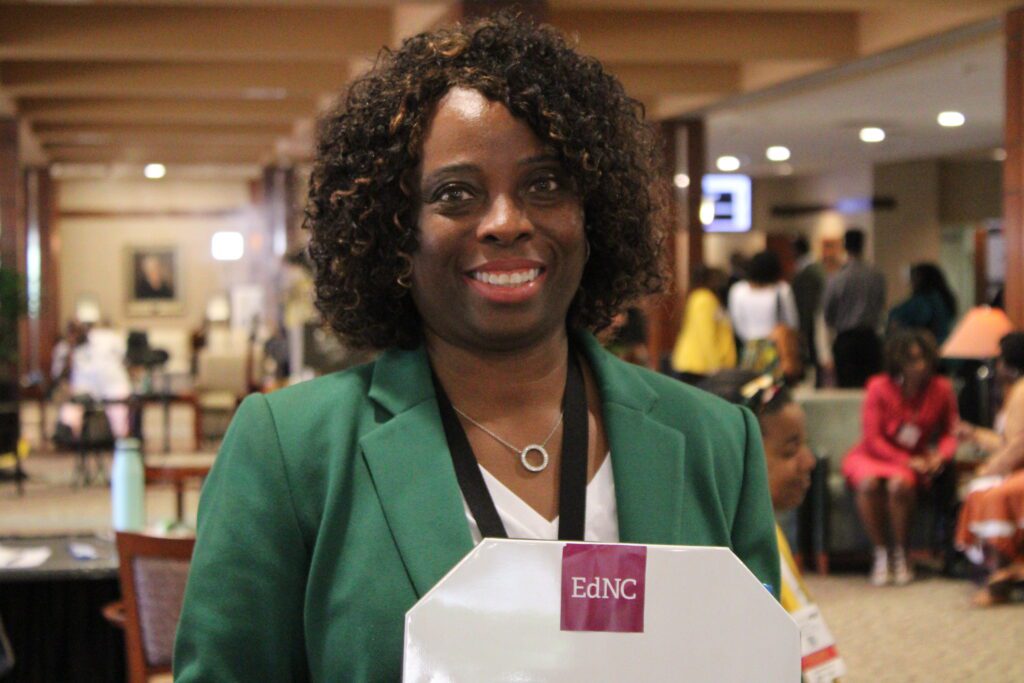
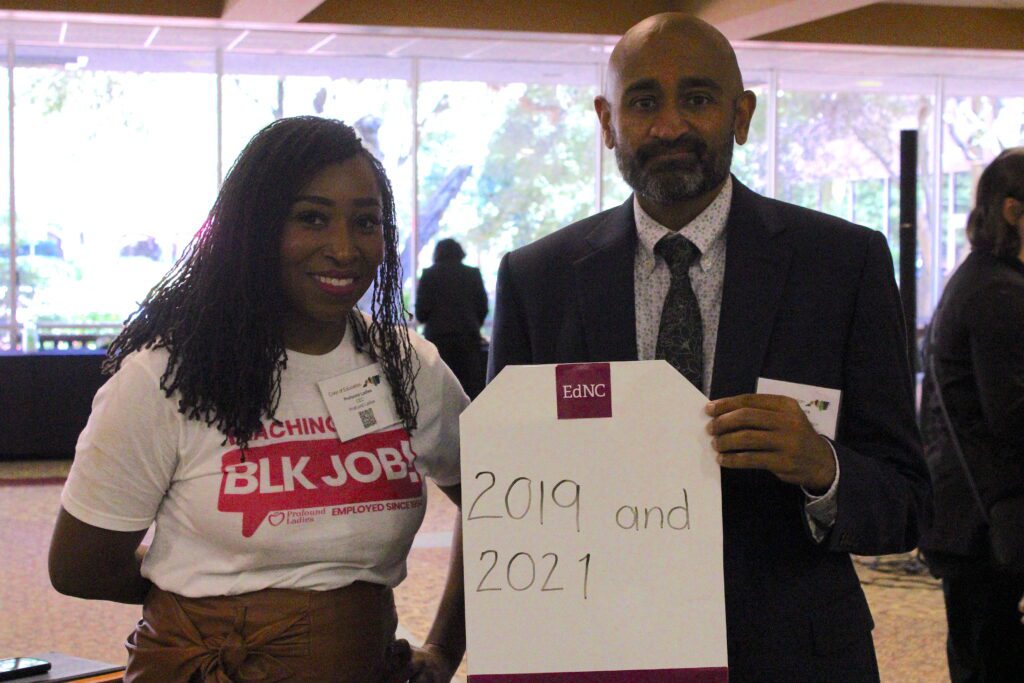
Angela Morse, who serves under the early educator support office at East Carolina University, said she wanted to expand her knowledge of education as she pursues her doctoral degree.
“With the program I’m serving, we primarily serve low income, at-risk children, and children of color, and I think it’s important to always increase my knowledge with that,” Morse said. “Even though I am a person of color, there’s always room for me to continue to grow with my education.”
“Something I really liked about Color of Education in particular was the way that it can bring community around pre-service teachers, and it can show you how educators who are teacher leaders, opposed to just a teacher, really build community and engage in activism, or even just continuing education within their roles. It makes me feel optimistic about the state of education, and it also makes me feel like I have a wider lens of what someone can do within education.”
Mary Ledford, education student at North Carolina State University
Breakout sessions
The summit offered attendees 20 different breakout sessions to attend across both days of the event. Many sessions were centered around equity, policy, and serving marginalized groups in North Carolina schools.
Each speaker gave a 45-minute presentation to in-person attendees and also broadcasted live to people watching remotely. Formats varied between small-panel discussions and data-rich presentations. Breakouts also gave the audience time to reflect on the lecture amongst themselves.
Dr. Michaela Krug O’Neill is an assistant research scientist at the University of Michigan and Dr. Simona Goldin is a research professor at University of North Chapel Hill. Together, they focused on highlighting examples of students exercising voice and advocacy.
In an example, they referenced 1965 archives of the “Lincoln Echo” publication written by student journalists from Lincoln High in Chapel Hill, which at the time was the segregated school for Black students.
Notably, one newspaper clipping contained an IQ test developed by the students that centered on Black culture. The students were combating alternative measures of intelligence while communicating the desire for their identity to be represented. This project was described by the researchers as an exemplar of “student learning in practice and an exhibition of academic brilliance.”
O’Neill said that across sources from different places and time, they see “commonalities in the practices that youth are engaging in to learn and to thrive and to push back against oppressive spaces and policies that affect them.”
Goldin added that, “we often punish children and youth for telling us what they disagree with, for declaring that they want freedom, for declaring that they want liberatory spaces.”
During a session on improving outcomes for rural students, attendees learned the basics of an educator preparation program (EPP) based at East Carolina University. The instructors said that they prepare teachers to build positive classrooms in their schools by teaching self-reflection and asset-framing tools. Presenters also discussed using books and other types of media to help students express their stories and different backgrounds.
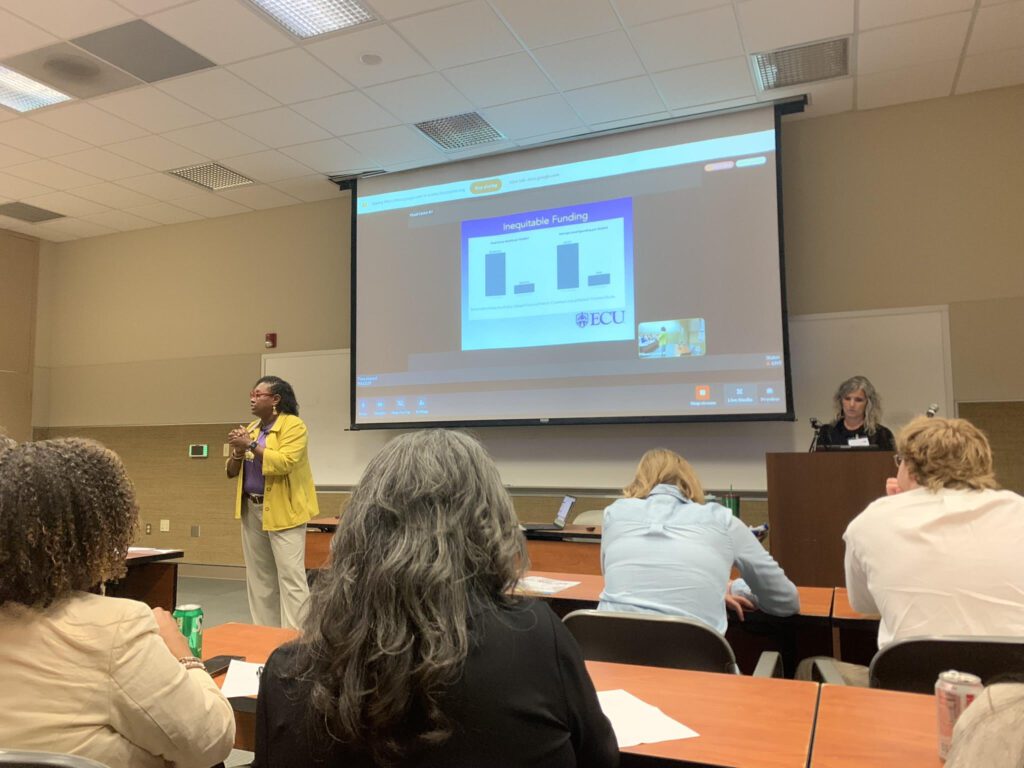
In reference to the climate around book bans and pushback on diversity, equity and inclusion (DEI), Shawnda Cherry, who helps organize the EPP, said their teachers can be inclusive with their curriculum because they are not presenting it in a radical way.
“We present equity, whether we say the word or not, but that means achievement for all students,” Cherry said. “We want all students to feel seen, heard, validated from an asset-based lens and feel empowered, and if we’re doing that for all children — who does not want that for any child? So, you know, why? How would you push back on that?”
After the session, attendee Tristan Hunter said that it reminds people of the value of not just having all students represented, but how they are represented.
“Also everything that we do in the classroom, from the curriculum that we teach to how we teach the curriculum, to who we’re making those connections to, should be evenly represented,” Hunter said. “But then also it should give students the opportunity to self-reflect, and for the teachers to self-reflect on what they’re doing inside the classrooms.”

Another breakout session included a panel of five educators who reflected on their experience in the Jeanes Fellowship program. Panelists answered questions from educators in the audience while reflecting on their equity projects in their respective counties.
Saletta Ureña, a Jeanes Fellow based in Guilford County, worked on an advocacy project highlighting the history behind the Sylvia Mendez Newcomers School. She told the audience that the experience gave her a stronger voice in her work.
“I wanted the magic of that moment between a student and a teacher to come to life in a different way, and I wanted students to own the power that they didn’t know they had,” Ureña said. “And I can’t do that if I’m too shy to talk, if I just sit in meetings and just kind of like a fly on the wall, and it took a while to come out of that.”
“In this work that we do, it’s so important for us to show up authentically for ourselves, in order for us to show up authentically for our children.”
Monique Brown, Profound Ladies
Call to collective action
In the end, attendees were called to continue doing equity work within their classrooms and in society. Townsend-Smith listed initiatives for educators to support.
“We must fully fund and implement the Leandro comprehensive review plan. We must recruit and retain a diverse educator workforce,” Townsend-Smith said. “We must ensure school mental health and safety and ultimately eradicate educational inequities.”
Speakers at the event talked about the need to have a democratic community that values all people — and the importance of voting in the upcoming election.
“We must exercise our right to vote,” Townsend-Smith said. “We must activate individual and collective responsibility to respond to injustices within and beyond education. We the People will lead the change through collective action.”
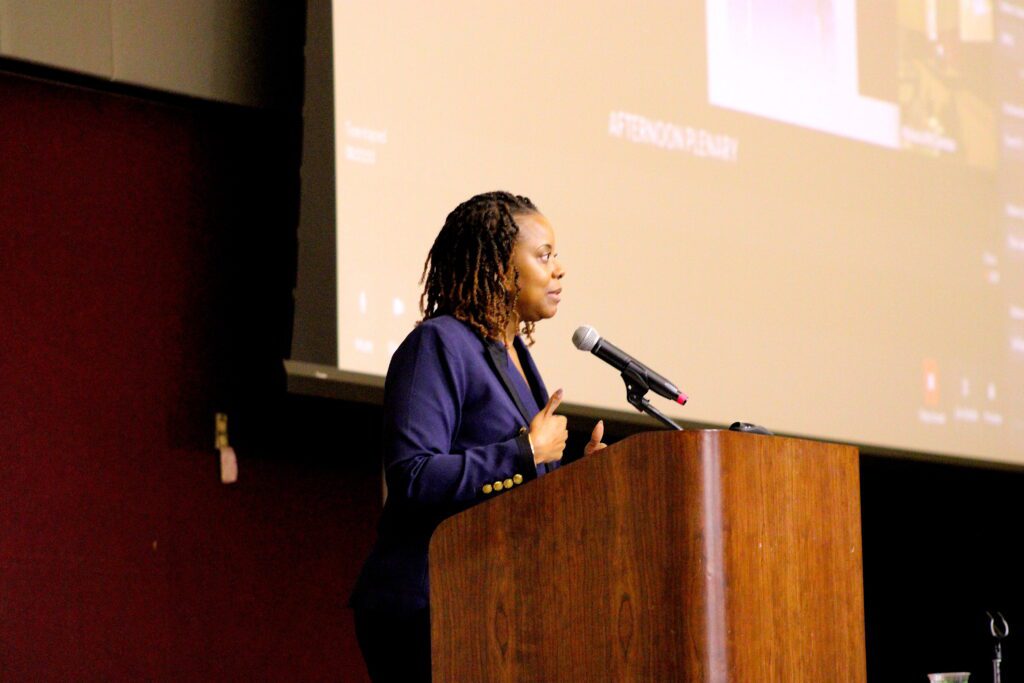
Chapel Hill-Carrboro City Schools Superintendent Dr. Nyah Hamlett served as a plenary speaker for the event. In her message, she drew parallels between one’s education leadership and the sport of boxing.
In the face of challenging times in public education, she stated that leaders must exhibit mental fortitude and have a vision forward.
Hamlett called upon the audience to embrace vulnerability, while being also unapologetic in their “why.” She also said leaders knowing who they are not is equally important as knowing who they are — especially when being met with various narratives about their leadership ability.
Overall, just as boxers must train themselves to not flinch, Hamlett called upon the audience to be unflinching in their authenticity.
“Children are depending on our authentic and connected leadership,” she said.


